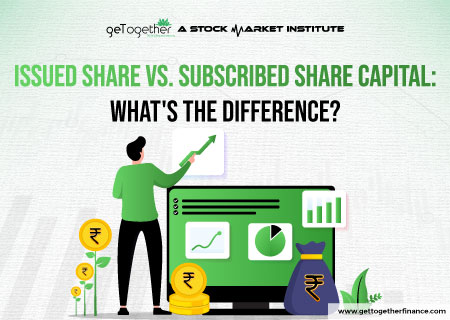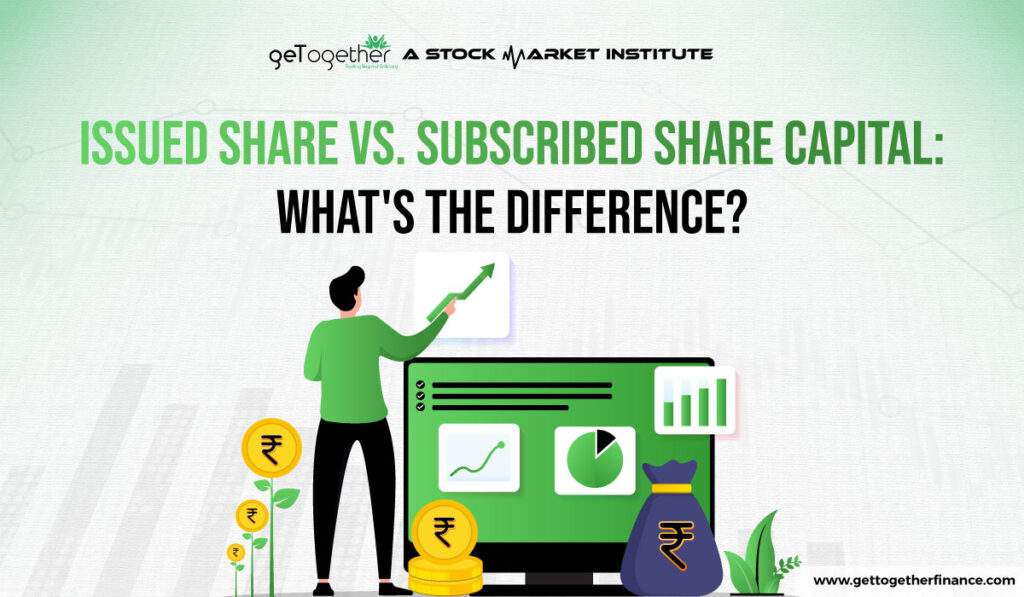Issued Share vs. Subscribed Share Capital: What’s the Difference?


Introduction
Understanding the importance of share capital is important for those involved in the world of corporate finance and investing. Two fundamental terms in this world are issued share capital and subscribed share capital. Both of them play distinct roles in the financial structure of a company.
Issued shares are to the authorized share issued by the company to its shareholders, it significantly represents the fraction of ownership held by the shareholder. On the contrary, subscribed share are the shares that investors commit to purchase; it can be purchased as a part of an initial public offering (IPO), a rights issue, or through private placements.
Knowing the differences between these terms is important for investors because they play a crucial role in corporate governance, financial reporting, and investor relations. This blog will help you learn definitions of issued share capital and subscribed share capital, their implications, and practical applications of Issued and Subscribed Share Capital. The importance of legal compliance and strategic financial management within corporations will be highlighted.
What Is Share Capital?

Share capital is the total value of funds a company acquires from investors by issuing shares. In other words, it’s the amount of money a business raises by selling their ownership stakes. It is often cheaper for a company to sell shares rather than borrow money from the banks, particularly in times of growth.
For instance, a company tries to float its business by starting an Initial Public Offering (IPO). The company sells part of its business by issuing shares. Shareholders who purchase the shares become stakeholders (part owners) of the company. Thus, the funds obtained from the selling of shares become the share capital of the company.
Share capital is the most important part, like a backbone of all types of businesses. It boosts growth opportunities, investment in marketing and enhancement in production without the company worrying about debts.
Types of Share Capital?

Depending on the context, the term share capital can mean different things. It is essentially the money that a company gets from selling its shares. When talking of how much money a company is allowed to raise, share capital is divided into different classifications.
1. Authorized Share Capital
This is the highest limit of capital that a company is legally permitted to raise through the issue of shares. A company has to get permission and declare the volume of equity that they are trying to raise before selling shares.
For instance, if a company is allowed to raise ₹100 crores with a par value of ₹10 per share, then, in total, it is allowed to issue shares up to 10 crores. It is not required to issue all those shares at once; it can issue them as per the requirements over time.
2. Issued Share Capital
Out of the approved share capital, the portion of shares that a company issues to the investors is referred to as issued share capital. This figure represents the total amount of shares the firm wishes to sell.
Let’s say a firm has an authorized capital of rupees 100 crores and issues shares of rupees 50 crores. In this case, the issued share capital is rupees 50 crores. The company is free to issue further shares in the future as long as it is within the issued limit.
Both types of shares capital help measure the potential and actual funds that a business can mobilize through sale of shares.
Issued Share Capital

Let’s understand issued share capital in detail.
Definition and Explanation
Issued share capital is the legally distributed shares by the company to its shareholders in exchange for equity. Simply they are the shares that retail investors can buy and sell whenever they want in exchange for pre-determined capital. Issued shares represents the ownership of investors in the company and gives them voting rights and the benefit of dividends determined by the company’s policies and financial performance.
Legal Implications and Requirements
For issued shares company needs to abide by certain legal requirements to carry out the process in a transparent way. The company needs to comply with company law, which varies by the working structure of the company; but generally includes the procedures for authorizing the issuance of shares, documenting the investor’s agreements, and filing necessary disclosure with regulatory authorities. The issuing company must also adhere to internal rules of the company to ensure transparency in the issuing process. It helps in the financial reporting process to maintain investors’ interest and regulatory compliance.
Subscribed Share Capital

Now let’s understand what are subscribed share capital!
Also Read: Undervalued Stocks
Definition and Explanation
Subscribed share capital refers to the fraction of a company’s authorized shares that investors have committed to but not may have paid the full amount yet. It represents the commitment from the investors or shareholders that they are willing to buy the shares at a specific price. Orders for subscribed shares are placed during the IPO, a rights issue, or through private placements.
Significance in Corporate Finance
Subscribed shares play an important role in corporate finance and capital raising. When investors agree to subscribe to buying shares, they provide the needed funding that companies can utilize for working operations like expansions, R&D, debt repayments, and other operational needs. The capital infusion from the public can significantly improve a company’s financial health and growth trajectory.
Also, the subscribed shares rate shows how much interest investors are having in the company’s growth. The market interest and support for the company’s business model can be anticipated with the successfully subscribed share capital, eventually helping investors know its future potential. From a corporate governance perspective, subscribed shares significantly influences strategic decisions like capital structure adjustments, dividend policies, overall financial planning, and most importantly investors’ interest in the company. The more subscribed IPO always leads to inflated interests.
Called-up v/s Paid-Up Subscribed Capital
Called-up share capital refers to the fraction of a company’s authorized amount that shareholders are required to pay upon the issuance. It represents the amount that shareholders are obligated to pay for their ownership stakes.
On the other hand, paid-up share capital refers to fully paid subscribed shares for which the amount is already transferred to the company.
While called-up subscribed capital represents the overall amount owed by shareholders, paid-up capital reflects the actual funds received by the company, which affects its financial health and operational capabilities.
Difference Between Issued Share Captial and Subscribed Share Capital

Now that you’ve individually understood what issued shares and subscribed shares. Let’s understand how they differ significantly from each other.
Certainly! Here’s a table outlining the key differences between Issued Share Capital and Subscribed Share Capital:
| Factor | Issued Share Capital | Subscribed Share Capital |
| Definition | It only represents the listed shares and the ones owned by shareholders. | It only refers to the shares that shareholders have committed to purchase |
| Payment | These shares are completely paid; open to trade and held by investors or traders. | Commitment to purchase the share is there, but they are not necessarily fully paid. |
| Process | Are initially issued IPOs, rights issues, private placements, etc. | These are subscribed through IPOs, rights issues, private placements, etc. |
| Financial Impact | It reflects the actual ownership of the shareholder or the investor and gives them voting rights in the company. | It indicated that shareholders (if got the IPO allotment or bought the shares by paying the full amount) can get voting rights. |
| Risk | Bears low risk as people are already owning the shares and have performance history. | High risk because if the subscription fails then the money of investors might go in vain. |
| Impact on Financials | It can be seen on the balance sheet of the company in the name of equities. | Initial commitment or subscription rate of investors maybe disclosed but not the value of fully paid shares is made open for all. |
| Regulatory Compliance | The issuer company must comply with legal requirements for issuance and disclosure. | Compliance in subscribed share capital involves commitments from investors and potential future payments. |
| Investor Perception | Indicates that investors have ownership in the company | It only denotes market demand and potential future capital that the company might be raising in exchange for equity sometimes debt. |
| Corporate Governance | Directly affects voting rights and shareholder decisions. | Influences strategic planning based on future capital inflow. |
Issued shares and subscribed shares are distinct yet similar in some ways. Both of them eventually offer ownership to the shareholder in exchange for funds. The risk and capital exposures differ in both which can help an investor decide what aligns with their investment goals.
If an investor wants to go with a well-established company with a good history and price trajectory, they can go with issued shares. Whereas, if an investor wants to go with an initial investment setup of the company by researching about its strong financial, they can go with subscribe share capita and enjoy the good returns over time.
Conclusion
To summarise, understanding the differences between Issued Share Capital and Subscribed Share Capital is critical for both investors and business stakeholders. Issued Shares refers to the shares that have been officially distributed to shareholders, indicating their ownership and voting rights. It represents current investor interest and market participation in a company’s equity. Subscribed Shares, on the other hand, refers to shares that investors have committed to purchasing but have not yet completely paid for, signalling potential for future capital inflows.
These principles are critical to corporate governance, financial reporting, and strategic decision-making. They influence investor impressions, regulatory compliance efforts, and a company’s overall financial health.
Understanding these contrasts allows stakeholders to make better investment decisions and comprehend the dynamics of the financial markets. Finally, a thorough understanding of Issued and Subscribed Shares improves transparency and enables intelligent investment strategies in an ever-changing corporate context.
Frequently Asked Questions
What is the difference between issued share capital and subscribed share capital?
Issued share capital is defined as shares that have been officially given to shareholders and constitute actual ownership and voting rights. Subscribed share capital, on the other hand, refers to shares that investors have agreed to buy but have not yet paid for in full, suggesting future capital inflow.
How does subscribed share capital impact a company’s financial health?
Subscribed shares is critical in providing finance for a company’s operations, including growth, R&D, and debt repayments. It represents investor confidence and interest in the company’s growth prospects, which affects its financial stability and ability to carry out strategic projects.
What are the legal implications of issued and subscribed share capital?
Issuing shares necessitates adhering to corporate law and regulatory frameworks, guaranteeing openness in the issue process, and preserving shareholders’ interests. Subscribed shares entails investor commitments that must comply with regulatory standards for disclosure and potential future payments.
How do issued and subscribed share capital affect investor relations?
Issued share capital represents current ownership and voting rights, which influences investor relations through transparency and governance procedures. Subscribed share capital indicates market interest and prospective future capital inflows, which influences investor perceptions of the company’s growth potential and investment appeal.
What role do issued and subscribed share capital play in corporate governance?
Issued share capital influences shareholder decisions and governance structures by specifying ownership rights and duties. Subscribed share capital influences strategic planning and capital structure modifications, directing business decisions based on projected future funding and investor commitments.



 Instagram
Instagram 
